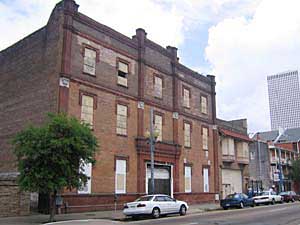On the other hand, there are some bright spots in Congress...
In "On the Katrina vs Historic Preservation Hearing and the Bigger Picture", Heather MacIntosh, President of Preservation Action, writes:
During the last week in August, relentless blasts of wind and rain and flood water battered the Gulf of Mexico’s historic coast, ripping off roofs, submerging basements, and forcibly evicting hundreds of thousands of residents who weren’t sure what they’d return to. Last week, the first hearing on historic preservation and the hurricane(s) aired testimony pointing to what the federal government could do in this extraordinary case. What was the prognosis? And why did the Subcommittee on Federalism and the Census consider the issue, not some other committee we normally associate with preservation policy?
 New Orleans after Hurricane Katrina. Reuters photo.
New Orleans after Hurricane Katrina. Reuters photo.Of all the many hearings conducted over the past months on hurricane response, this particular hearing’s content and the hearing’s host Subcommittee stand out. A hearing on the Coast Guard’s response to Katrina is scheduled within Homeland Security & Government Affairs; the problem of water resource needs following the hurricanes is being considered by the Environment and Public Works committee, and so on. The relationship between preservation, the hurricanes and Government Reform is both exceptional and interesting in this context.
The Subcommittee’s chair, Ohio Representative Michael Turner (R-OH) was Dayton’s two-term mayor and a community activist before being elected to national office. Turner and North Carolina Representative Brad Miller (D-NC)) started the historic preservation caucus a few years ago.
Turner’s Federalism and the Census Subcommittee and its overarching Committee, Government Reform, consider big picture issues that have interagency impact. The Subcommittee’s work this Congress suggests new avenues for advancing new and positive federal preservation policy, figures into why the hearing took place in Turner’s Subcommittee, and why preservationists should continue to work with this Subcommittee and the preservation caucus regardless of what we see in the next relief package.
The Subcommittee has stated for the record that during the 109th Congress it “plans to review the Community Development Block Grant Program and other programs important to the revitalization of America's cities. The Committee will also inquire into what efforts can be undertaken by the Federal government to assist state and local entities in addressing community development, historic preservation, brownfield relief and other issues.”
While looking at the challenges preservationists are facing this session in Congress, the Subcommittee’s work provides a welcome counterpoint. One of the goals of the November 1 Subcommittee hearing was to diagnose a general problem with an eye toward long-term solutions. The overarching committee is looking at overarching government reform.
“Reform” is a word we’ve heard a lot lately in connection to preservation-related legislation including proposed changes to Section 106 (too onerous, not enough predictability, therefore needs reforming). Or tax reform (scandalous abuses to the conservation easement program, therefore needs reforming). Reform has been cast as solving what’s wrong with preservation policy, so it’s comforting and inspiring to see that historic preservation is also being considered as an agent for reform within a Subcommittee charged with shepherding policy changes government-wide.
 Naval Brigade Hall in New Orleans, demolished without authorization by visiting members of the Chicago Fire Department, abetted by the apparently unrepentent Ferrara Fire Apparatus Inc.
Naval Brigade Hall in New Orleans, demolished without authorization by visiting members of the Chicago Fire Department, abetted by the apparently unrepentent Ferrara Fire Apparatus Inc. New Orleans. Photo by Rick Loomis, Los Angeles Times.
New Orleans. Photo by Rick Loomis, Los Angeles Times.
The specific question posed by the Subcommittee in the hearing’s title “Historic Preservation vs. Katrina: What Role Should Federal, State and Local Governments Play in Preservation of Historic Properties Affected by this Catastrophic Storm” is intended to start a dialogue to aid in shaping policy beyond this very complex immediate problem. At the hearing, Turner stated his interest in creating a thorough transcript of the proceedings, a document of the questions and answers posed during this historic moment. The information gathered can and will likely have multiple applications, not just aid the government in its hurricane response.
So what do we do now?
First, be thankful. Send Representative Turner a thank you card or letter:
Congressman Michael Turner
1740 Longworth Building
Washington, DC 20515.
Secondly, be helpful, acknowledge we’ve got growing support in Congress and cultivate relationships with those who want to help us (this link lists members of the Preservation Caucus). And lastly, don't be daunted if we don't get what we want right away to support the best sort of rebuilding effort in the Gulf.
The extensive damage seen in Louisiana, Mississippi and Alabama (and later in Texas) has laid bare the needs and issues facing preservationists in communities nationwide in a very dramatic way. While national leadership is reticent to expend what the affected states (and preservationists) would like on hurricane relief, and seems to be using tax incentives only to support infrastructural improvements and business development, the lessons provided by the hurricanes could have a tremendously positive effect on federal preservation policy and other policies with existing or potential impact to historic resources.
We were hoping the latest tax relief package would include a provision for owners of historic homes, but the House bill (H.R. 4155) proposed just days before the November 1 hearing was a little light on tax incentives for historic property rehabilitation and contained no support for home owners. Only a slight deepening of the existing credit was proposed. The Senate Finance Committee is scheduled to vote on a $68.8 billion package of tax cut extensions and Gulf Coast rebuilding incentives tomorrow. Today, some Members of Congress are holding a press conference to discuss the introduction of legislation that would provide grants of up to $150,000 to rebuild or repair homes of hurricane victims who lived outside the insured flood zone. A lot is still up in the air.
But regardless of what we see in the final packages, we should not view the legislation as the end of the conversation formally begun on November 1. The hearing, the work of the Subcommittee and the growing Preservation Caucus all represent something big, a demonstrable shift toward positive reform. Just what comes of this lies in our own commitment to developing working relationships with those dedicated to improving federal policy in support of preservation.
When you are considering the general question asked by the Subcommittee, that is, the role of the federal government in protecting historic properties, and one of its primary objectives this Congress, that is, how the federal government could better help facilitate preservation nationwide, be sure to let Preservation Action know. The question asked by the Subcommittee should be the same question we, the grassroots ask ourselves on an ongoing basis. Answers to the Big Question have the power to inspire us as well as Congress. Inspiration and dedication are necessary to see big ideas, like tax credits for owners of historic homes, through. We just have to build on the growing momentum. And when we play forward, think big, and inspire we’re then not just in the business of suggesting and advocating policy amendments, we’re in the business of reform, demonstrating preservation’s relevancy by sharing its value not just with those concerned with tax law or spending, but with leadership actively engaged in improving our collective standard of living and the quality of life for every citizen nationwide.



0 Comments:
Post a Comment
<< Home